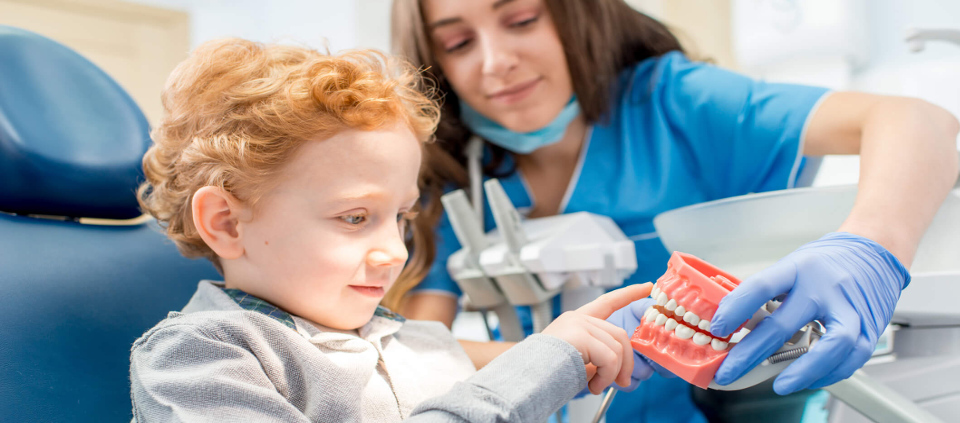Pediatric Dental Emergencies: What Moms And Dads Need to Know for Quick and Effective Therapy
In the realm of pediatric medical care, oral emergencies can emerge suddenly, leaving parents unclear of exactly how to deal with the circumstance effectively. Recognizing the signs, kinds of injuries, and immediate activities to take can make a considerable difference in the result for a child's oral wellness. With a quick and ideal feedback, moms and dads can reduce possible long-term repercussions and guarantee their kid obtains the necessary treatment without delay. By being prepared and informed, parents can play a crucial duty in protecting their kid's oral health.
Indications of Pediatric Dental Emergencies
When analyzing pediatric dental emergency situations, it is important for parents to be alert for specific signs indicating potential major problems. One of the main indications of a dental emergency situation in children is consistent tooth pain that is not alleviated by over-the-counter pain medications. This might indicate a hidden infection or damage that calls for instant focus from a dental practitioner. Swelling in the gum tissues, face, or jaw location is an additional red flag that ought to not be disregarded, as it might be an indicator of an abscess or other severe dental condition.

Common Kinds of Oral Injuries
Typical kinds of dental injuries in kids often result from mishaps or sports-related tasks that can lead to various kinds of trauma to the mouth and teeth. One typical oral injury is a fractured tooth, which can range from a small chip to an extra severe break entailing the inner layers of the tooth. Kids might also experience dental injuries like tooth breach, where the tooth is pressed right into the jawbone, or avulsion, which is the total variation of a tooth from its outlet.
Immediate Emergency Treatment Actions
Upon coming across a pediatric oral emergency situation, swift and suitable emergency treatment measures are critical to minimize discomfort and avoid more complications. For a knocked-out tooth, instruct the child to carefully wash the tooth with water, attempting not to touch the root, and area it back in the outlet ideally. If re-implantation is not feasible, store the tooth in a container of milk or the kid's saliva up until getting to the dental practitioner. In cases of a damaged or why not look here cracked tooth, rinse the mouth with warm water and apply a chilly compress to reduce swelling. A bitten lip or tongue ought to be cleaned up carefully with water, and a cool compress can aid alleviate pain and minimize swelling. For objects stuck between teeth, avoid using sharp tools and instead encourage the kid to delicately floss to remove the product. In all instances, it is important to get in touch with a pediatric dental expert immediately for further assessment and treatment.
When to Look For Professional Assistance
Seeking punctual oral care from a pediatric specialist is necessary in addressing prospective problems arising from pediatric oral emergencies. Moms and dads should look for expert help immediately if their youngster experiences serious tooth discomfort, facial swelling, hemorrhaging that does not stop, a knocked-out long-term tooth, or any kind of trauma to the mouth or face. These indications show a significant dental problem that requires instant focus from a pediatric dental expert.
In addition, if a child experiences persistent tooth level of sensitivity to hot or cold, problem eating or ingesting, or indicators of infection such as pus around the gums, parents must not postpone in looking for expert oral care. These signs can indicate underlying dental problems that need to be dealt with promptly to stop additional difficulties.
In instances of dental emergency situations, it is crucial for parents to speak to a pediatric dental practitioner immediately to ensure proper diagnosis and therapy - pediatric dentist. Postponing expert assistance can lead to exacerbated oral concerns and prolonged pain for the child

Avoiding Future Dental Emergencies
To minimize the probability of future dental emergencies, parents must focus on constant dental health techniques and regular brows through to a pediatric dental practitioner for preventive care. Urging youngsters to comb their teeth two times a day with fluoride tooth paste and educating them the correct method for two minutes each time can significantly decrease the threat of oral problems. Flossing daily is also important to get rid of plaque and food fragments between teeth, where a toothbrush can not get to. Furthermore, find the closest dentist limiting sweet snacks and drinks can assist avoid dental caries and dental caries.
Regular sees to a pediatric dentist for exams and cleanings are important for early discovery of any possible oral issues. These visits allow the dental practitioner to keep an eye on the child's oral wellness, provide expert cleanings to get rid of plaque and tartar accumulation, apply fluoride therapies for added defense, and offer advice on correct oral treatment methods.
Conclusion
In verdict, parents need to know the signs of pediatric oral emergencies, typical sorts of dental injuries, prompt emergency treatment actions, and when to seek specialist assistance. By taking aggressive steps to protect against future dental emergency situations, parents can ensure quick and reliable treatment for their try this out youngsters. It is necessary to remain informed and prepared in order to take care of any type of oral emergency that may arise.